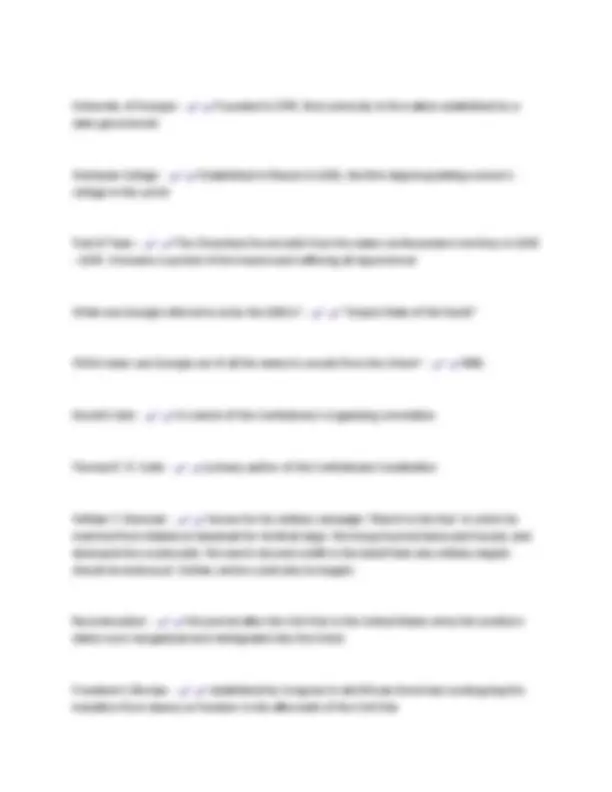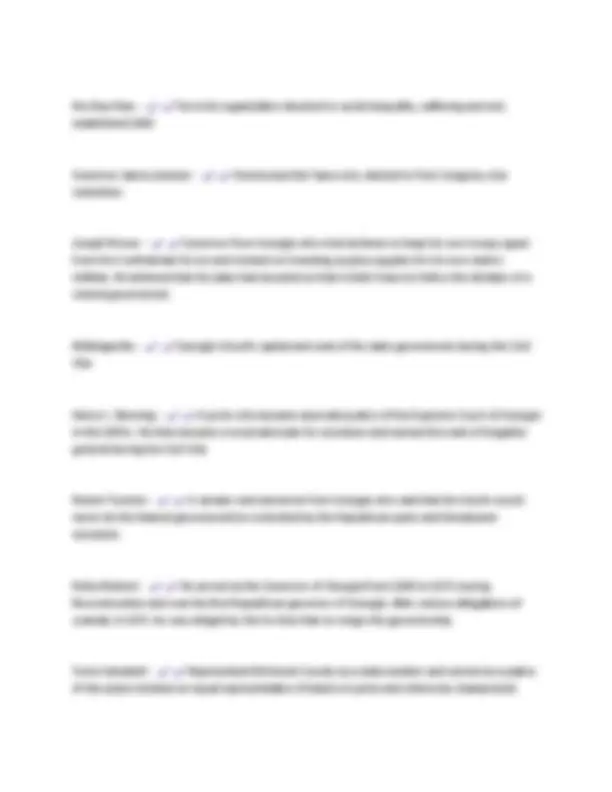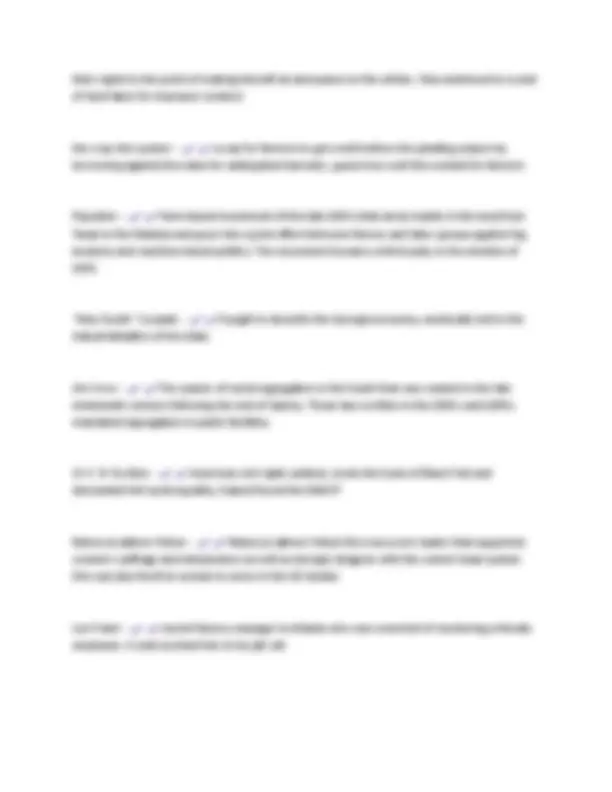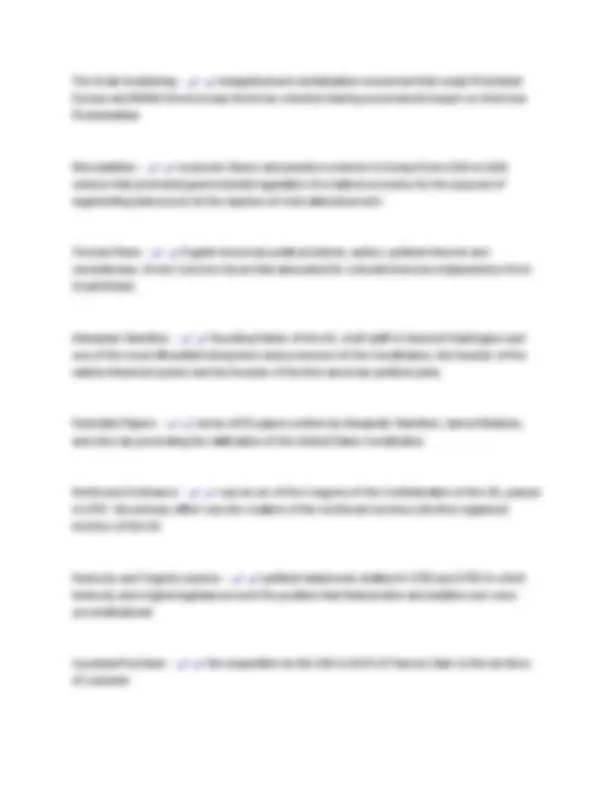








Study with the several resources on Docsity

Earn points by helping other students or get them with a premium plan


Prepare for your exams
Study with the several resources on Docsity

Earn points to download
Earn points by helping other students or get them with a premium plan
Community
Ask the community for help and clear up your study doubts
Discover the best universities in your country according to Docsity users
Free resources
Download our free guides on studying techniques, anxiety management strategies, and thesis advice from Docsity tutors
In what year was Georgia established? - 1732 When did settlement take place in Savannah? - 1733 How long was Georgia in existence before there was a governor or governing body within the colony itself? - Two decades Who ruled Georgia in the beginning? - Define: Board of Trustees - Board of Trustees The governing body of Georgia in London England. King George signed a charter establishing the colony and creating its governing board What years is Georgia referred to as "Trustee Georgia"? - 1732 - 1752 What were four things that were outlawed when Georgia was founded? - lawyers, and Catholics Who was the impetus behind Georgia's founding? - slavery, rum, James Edward Ogelthorpe Battle of Bloody Marsh - On St. Simons Island between the English and the Spanish. It was an attempt of the Spanish to invade Georgia Who from Georgia signed the Declaration of Independence? - Button Gwinnett, Lyman Hall, and George Walton
Typology: Exams
1 / 12

This page cannot be seen from the preview
Don't miss anything!







In what year was Georgia established? - 1732 When did settlement take place in Savannah? - 1733 How long was Georgia in existence before there was a governor or governing body within the colony itself? - Two decades Who ruled Georgia in the beginning? - Board of Trustees Define: Board of Trustees - The governing body of Georgia in London England. King George signed a charter establishing the colony and creating its governing board What years is Georgia referred to as "Trustee Georgia"? - 1732 - 1752 What were four things that were outlawed when Georgia was founded? - slavery, rum, lawyers, and Catholics Who was the impetus behind Georgia's founding? - James Edward Ogelthorpe Battle of Bloody Marsh - On St. Simons Island between the English and the Spanish. It was an attempt of the Spanish to invade Georgia
Who from Georgia signed the Declaration of Independence? - Button Gwinnett, Lyman Hall, and George Walton Who from Georgia signed the US Constitution? - Abraham Baldwin and William Few Jr. Which state was Georgia to enter the Union when it ratified the Constitution in 1788? - Fourth What was the most serious military confrontation between British and American troops? - Siege of Savannah in 1779 Where was the capital moved to and from in 1779? - Savannah to Augusta Battle of Kettle Creek - Took place in Wilkes County Nancy Hart - a female patriot and spy credited with killing several Tories at her home When was the ban on slavery in Georgia lifted? - 1752 Eli Whitney - inventor of the cotton gin Yazoo land fraud - 1795, the sale of western land to four land companies after the governor and members of the General Assembly had been bribed / land companies bribed GA leaders to sell land cheaply; resulted in U.S. take-over of disputed land James Edward Ogelthorpe - The leader of English Parliament who founded the Georgia colony, in order to create an effective buffer from the Spanish and Spanish controlled Florida.
Klu Klux Klan - Terrorist organization devoted to racial inequality, suffering and evil, established 1868 Governor James Jackson - Overturned the Yazoo Act; elected to First Congress; lost reelection Joseph Brown - Governor from Georgia who tried at times to keep his own troops apart from the Confederate forces and insisted on hoarding surplus supplies for his own state's militias. He believed that his state had seceded so that it didn't have to follow the dictates of a central government. Milledgeville - Georgia's fourth capital and seat of the state government during the Civil War Henry L. Benning - A jurist who became associate justice of the Supreme Court of Georgia in the 1850s. He then became a vocal advocate for secession and earned the rank of brigadier general during the Civil War Robert Toombs - A senator and extremist from Georgia who said that the South would never let the federal government be controlled by the Republican party and threatened secession. Rufus Bullock - He served as the Governor of Georgia from 1868 to 1871 during Reconstruction and was the first Republican governor of Georgia. After various allegations of scandal, in 1871 he was obliged by the Ku Klux Klan to resign the governorship. Tunis Campbell - Represented McIntosh County as a state senator and served as a justice of the peace.Insisted on equal representation of blacks in juries and otherwise championed
their rights to the point of making himself an annoyance to the whites. Was sentenced to a year of hard labor for improper conduct. the crop-lien system - a way for farmers to get credit before the planting season by borrowing against the value for anticipated harvests ; guess how well this worked for farmers Populism - Farm-based movement of the late 1800s that arose mainly in the area from Texas to the Dakotas and grew into a joint effort between farmer and labor groups against big business and machine-based politics. The movement became a third party in the election of
"New South" Crusade - Sought to diversify the Georgia economy; eventually led to the industrialization of the state. Jim Crow - The system of racial segregation in the South that was created in the late nineteenth century following the end of slavery. These laws written in the 1880s and 1890s mandated segregation in public facilities. W. E. B. Du Bois - American civil rights activist; wrote the Souls of Black Folk and demanded full racial equality; helped found the NAACP Rebecca Latimer Felton - Rebecca Latimer Felton She was a civic leader that supported women's suffrage and temperance as well as strongly disagree with the convict lease system. She was also the first woman to serve in the US Senate Leo Frank - Jewish factory manager in Atlanta who was convicted of murdering a female employee. A mob lynched him in his jail cell.
Ben Epps - father of aviation in the state Charles Lindbergh - acclaimed aviator William B. Hartsfield - established Hartsfield Airport, also later became mayor of Atlanta Brown vs. Board of Education - ruled that the "separate but equal" laws were unconstitutional Why did colonists come to the new world? - religious freedom, profit, adventure and more Iroquois League - ... indentured servant - A poor person obligated to a fixed term of labor. "...it depended for labor in its early years mainly on white indentured servants.... Hernan Cortes - spanish conquerer Jamestown - settled and named after king James The Stono Rebellion - a band of slaves marching proclaiming Liberty in 1739. they marched over ten miles and killed between 20-25 whites William Penn - early Quaker who founded Pennsylvnia
The Great Awakening - evangelical and revitalization movement that swept Protestant Europe and British America (esp American colonies) leaving a permanent impact on American Protestantism Mercantilism - economic theory and practice common in Europe from 16th to 18th century that promoted governmental regulation of a nations economy for the purpose of augmenting state power at the expense of rival national powers Thomas Paine - English-American political activist, author, political theorist and revolutionary. Wrote Common Sense that advocated for colonial Americas independence from Great Britain Alexander Hamilton - founding Father of the US, cheif staff to General Washington and one of the most influential interpreters and promoters of the Constitution, the founder of the nations financial system and the founder of the first american political party Federalist Papers - series of 85 papers written by Alexander Hamilton, James Madison, and John Jay promoting the ratification of the United States Constitution Northwest Ordinance - was an act of the Congress of the Confederation of the US, passed in 1787. the primary effect was the creation of the northwest territory (the first organized territory of the US Kentucky and Virginia resolves - political statements drafted in 1798 and 1799 in which kentucky and virginia legislatures took the position that federal alien and sedition acts were unconstitutional Louisiana Purchase - the acquisition by the USA in 1803 of Frances claim to the territory of Louisana
Battle of Wounded Knee - ... Sherman Anti-Trust Act - ... Booker T. Washington - ... Free Silver - ... Open Door Policy - ... Calvin Coolidge - ... Scopes Trial - ... Father Charles Coughlin - ... Tenneessee Valley Authority - ... Lend-Lease Act - ... Hiroshima - ... Containment - ... Cuban Missile Crisis - ...
Brown v. Board of Education - ... Malcolm X - ... John F. Kennedy - ... Tet Offensive - ... Affirmative Action - ...California 1990s Moral Majority - ... Reagan Revolution - ... Operation Desert Storm - ... Ross Perot - ... NAFTA - ... Ronald Reagan was referring to ________ when he spoke of the "Evil Empire." - the Soviet Union Which nation held fifty-eight hostages in their capital's American Embassy in 1979 and 1980? - Iran